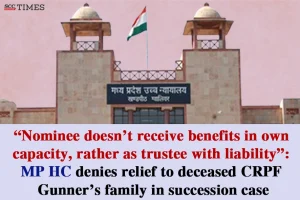Madhya Pradesh High Court: In a civil revision application filed under Section 384 (3), of the Indian Succession Act, 1925 (‘ISA’), read with Section 115 of the Code of Civil Procedure, 1908 (‘CPC’), against the Civil Court’s judgment denying appellant 1, mother of the deceased, a share in the property, the Single Judge Bench of G.S. Ahluwalia, J., dismissed the petition, holding that no illegality was committed by the Civil Court and the Appellate Court as merely because a person has been made a nominee, he would not receive the benefits in his own personal and individual capacity, rather he would receive it as a trustee with liability to return the amount to those in whose favour the law creates a beneficial interest.
Background
The deceased was working as a Gunner in the Central Reserve Police Force (‘CRPF’), and he got married to respondent 1 in 2016. However, he died in a vehicular accident the next year. The applicants, the family of the deceased, filed an application under Section 372 of the ISA for the grant of a succession certificate, which was registered as a succession case. Similarly, the widow of the deceased also applied Section 372. Both the succession cases were tried jointly by the Civil Court, and vide the impugned common judgment, it was held that the widow and applicant 1, mother of the deceased, were entitled to a succession certificate to the extent of half of the property.
Aggrieved, the family of the deceased filed an appeal, which was dismissed by the Appellate Court vide the impugned judgment. Hence, the present revision petition.
The family contended that since the parents of the deceased were made nominees in his service record, they were entitled to receive the entire dues of their deceased son. Further, Rs. 25 Lakhs were already paid by the Government to the widow, and the Civil Courts refused to give a share of that amount to the mother of the deceased.
Issue
What is the status of a nominee? Whether the nominee holds the property to the exclusion of the claim of the heirs of the deceased, or the nominee holds the property as a trustee on behalf of the heirs?
Analysis
While placing reliance on Sarbati Devi v. Usha Devi, (1984) 1 SCC 424, and Vishin N. Khanchandani v. Vidya Lachmandas Khanchandani, (2000) 6 SCC 724, the Court reiterated that merely because a person has been made a nominee, he would not receive the benefits in his own personal and individual capacity, rather he would receive it as a trustee with liability to return the amount to those in whose favour the law creates a beneficial interest. The nominee will be governed by the law of succession. Therefore, the Court rejected the contention that since the parents were made nominees in the service record of their deceased son, they were entitled to receive the entire amount.
Regarding the family’s contention that an ex gratia amount of Rs. 25 Lakhs had been wrongly paid by the Government to their son’s widow, the Court stated that the present case arose out of an application filed under Section 372 of the ISA; it was not a regular civil suit. Noting this, the Court held that if the family thought that they had half share in the ex gratia amount, then they had a remedy under civil law for recovery of the said amount, but the Court, in exercise of its revisional power under Section 384 of the ISA, could not direct the widow to return half of the ex gratia amount to the mother of the deceased.
Accordingly, with liberty to the mother of the deceased to file a suit for recovery of 50% of the ex gratia amount, the Court rejected the contention that the department should not have paid the said amount to the widow.
Lastly, regarding the contention that the maturity amount of the life insurance policy had not been paid, the Court held that since the present revision petition arose out of an application filed under Section 372 of the ISA, the Court was merely required to adjudicate as to whether the family had any right or share in the property mentioned in the proceedings or not. If the family was of the view that they had a right to get half of the maturity amount of the life insurance policy, then they had the liberty to avail themselves of the statutory remedy available to them for recovery of the same.
Thus, the Court held that no illegality was committed by the Civil Court and Appellate Court by holding that the mother was not entitled to a half share in the dues of her deceased son.
Accordingly, the petition was dismissed.
[Sudha Tomar v. Neha Tomar, 2025 SCC OnLine MP 6482, decided on 03-09-2025]
Advocates who appeared in this case:
For the petitioner: Alok Katare
For the respondent: Dy. Solicitor General Praveen Kumar Newaskar, Anchit Jain, and Sunil Kumar Gupta

